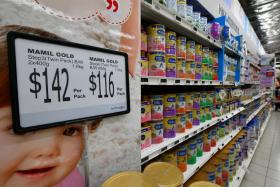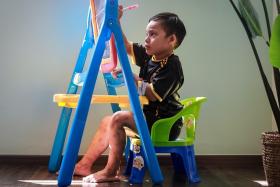Government taking steps to ensure affordable milk powder options
Govt taking steps to ensure affordable infant formula options
Regardless of price, all infant formula milk sold here meets quality and safety standards, as well as the nutritional requirements for infants to grow healthily.
Dr Koh Poh Koon, Senior Minister of State for Trade and Industry, gave this assurance in Parliament yesterday after two young mothers in the House - Macpherson MP Tin Pei Ling and Pasir Ris-Punggol GRC MP Sun Xueling - raised concerns about milk powder prices.
Ms Tin, who has a young son, had asked why the rise in prices had far exceeded inflation rates and increments in other countries.
Ms Sun, a mother of two girls aged five months and four years old, said in a Facebook post that a standard tin of 900g of infant formula costs about $56 on average, compared to $25 in 2007 - a 120 per cent rise over 10 years.
A check of four supermarkets yesterday showed that prices of common milk powder brands can vary from less than $20 to over $60.
Dr Koh said that some infant formula companies give the impression that their brands can "do more for children", but the scientific evidence is weak.
"Without better information, parents should be careful about relying on the claims made by infant formula companies, or be misled into using price as a proxy for the quality of the product," he said, while stressing that cheaper options are just as nutritious.
Mr Koh also said the Government will take steps to ensure affordable infant milk powder by making more brands available to foster stronger price competition and provide more choices for parents.
By the end of the year, it hopes to simplify and streamline import requirements, and remove unnecessary barriers to entry.
To protect consumers, there will be more restrictions on advertising and labelling of infant formula. For instance, the Agri-Food and Veterinary Authority will prohibit the use of nutrition and health claims and idealised images for infant formula milk.
Currently, a code of ethics restricts advertising, marketing and promotion of infant formula for babies below six months.
The Health Promotion Board is reviewing if this advertising restriction could be extended to formula for infants up to 12 months old.
Singapore Management University Associate Professor of Marketing Hannah Chang said most parents would choose to err on the side of caution when it comes to baby products.
"Despite economic reasons, parents tend to make emotional decisions.
"They would chose to pick a brand that is trusted, especially if they are new parents," she said.
But Prof Chang thinks that increasing the options available and assuring parents that all brands sold here meet stringent quality standards is a step in the right direction.
Killiney Family and Wellness Clinic's Dr Clarence Yeo said most parents are unlikely to switch brands based on price unless their child shows intolerance to the milk.
Low-income families who need to buy infant formula will get help, the Ministry of Social and Family Development (MSF) said in a written reply yesterday to Potong Pasir MP Sitoh Yih Pin and Aljunied GRC MP Low Thia Khiang.
Parents choose pricier milk powder due to kids' allergies
The increasing prices of infant formula might be painful, but the baby's well-being is more important, said parents The New Paper spoke to yesterday.
They often choose more expensive brands of milk powder because of their children's allergies.
Mr Tinesh Siv, 29, has been searching for a suitable formula for his one-month-old daughter. She has a sensitive stomach and often vomits milk.
ADDS UP
He said: "She drinks a lot of milk, so one tin lasts about 1½ weeks. That adds up to over $100 a month. And the formula (for sensitive stomachs) will probably be more expensive."
Mr Ken Lim, 35, who has 20-month-old twins, tries to save money by supplementing milk powder with breast milk. His twins have gone through many brands because they often suffer from constipation or diarrhoea.
Mr Lim, who works in the lift maintenance industry, estimated he spends $1,200 a month on milk powder and diapers.
Ms Ernie Ellysa, 25, whose 14-month-old daughter has a skin allergy, said she spends about 30 per cent of her income on goat milk powder.
The patient service associate, who also has a seven-year-old son, noticed there has been a price increase over the years.
"I used to give my son Similac because it contained DHA and Omega-3, which I thought would be good for his health. I've also tried giving my daughter regular milk powder before she had her skin allergy."
Some parents admit that the milk powder brand matters.
A Chinese national who wanted to be known only as Ms Xiu Xiu said: "I think the prices here are definitely more expensive, but I'll still buy it because it is safer."
The 33-year-old housewife added: "I trust leading milk powder products, such as those with positive titles on them."

Get The New Paper on your phone with the free TNP app. Download from the Apple App Store or Google Play Store now





